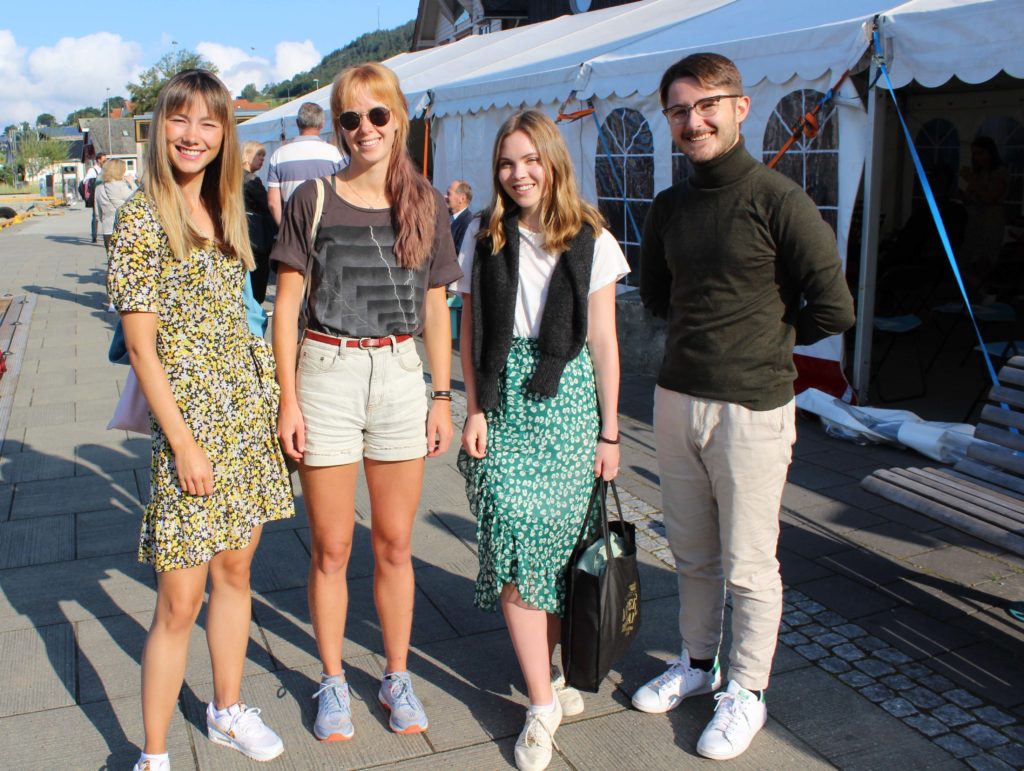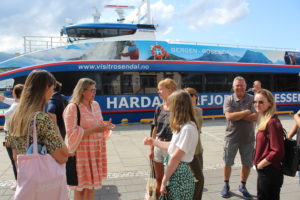The publication of the first findings of the sixth IPCC climate report coincided with the start of the Norwegian regional conference Rosendalsveko (August 9th – 11th). For the young participants at the conference, the dire findings of the report and warnings of a “code red for the planet” came as no surprise.

Silje Skjelsvik, founder of “About Tomorrow”, Vår Dundas (PhD-student at Uib) Lise Tenold (student, NHH Norwegian School of Economics), Sigurd Melkenborg Salvesen (Student parliament at UiB).
The contrast from the beautiful natural surroundings by the Hardangerfjord in western Norway in full summer glory, to the warnings of the IPCC climate report, was keenly felt. The surrounding areas experience consequences such as the glacier melting now deemed unstoppable, of the nearby glacier Folgefonna.
New this year at the climate conference Rosendalsveko, are the additional sessions in the weekend leading up to the conference, in the form of a youth camp devoted to climate issues and interdisciplinary efforts for a greener future. Many participants here stayed for the main conference, creating extra awareness of the urgency of the issues. Central to this initial weekend of the conference, is the student organization “Om i morgen”, in English “About Tomorrow”.
Responsible utilization of the coastline
– We want to make sure that today’s solutions don’t become tomorrow’s problems. Sustainability issues are even more of a pressing area for the younger generations, says Silje Skjelsvik, founder of “About Tomorrow”.
As a climate scientist, she is not surprised that the findings of the sixth IPCC climate report paint an even bleaker picture of the health of the planet, with a connection between the increasing severity of natural disasters and temperature rise from human activity confirmed by the report.
Sigurd Melkenborg Salvesen was one of the participants at the youth camp who decided to stay for the whole conference.
– Rosendalsveko has proved to be a great meeting place for people to discuss sustainability issues. For me it was particularly interesting to follow the sessions on responsible utilization of the coastline in western Norway, as well as sessions looking at how interdisciplinarity can further sustainability efforts, Sigurd Melkenborg Salvesen says.
Like the rest of the group, he hopes that the youth camp leading up to the conference (to which the AE-Bergen Knowledge Hub is a contributor), will become a permanent fixture of the Rosendal Week.
Broad perspective on sustainability issues
For the young participants, it is important to have as broad a perspective as possible on sustainability issues.

Vakre Rosendal dannet rammen for andre årgang av klimakonferansen Rosendalsveko.
– Some of the environmentally friendly solutions come at a cost. Today battery technology is one of the central alternatives to fossil fuels in the transport sector, but battery production can have a significant carbon footprint. If solar or wind energy is a viable alternative in the area of production, it should be utilised. Looking at all the alternatives with a broad perspective is necessary in finding tomorrows green solutions, Silje Skjelsvik says.
Situated in Rosendal by the Hardangerfjord in western Norway, the place itself serves as reminder of the value of nature and is thus an ideal place for a climate conference. Regional businesses help organize the event along with The Folgefonna outreach Centre, the Institute for Marine Research and the Bjerknes Centre for Climate Research. Several of the sessions touched on topics concerning interaction between business and academia to further sustainable solutions.
